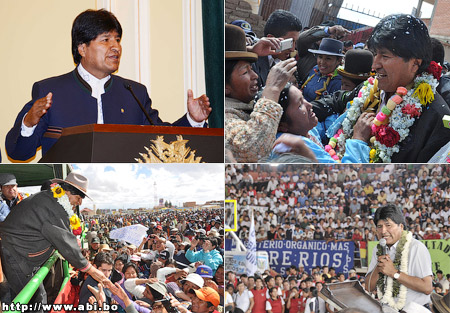Bolivian leader Evo Morales tends to speak in a carefully chosen language, in part as a precaution natural for someone who is permanently under fire from his opponents. It long became a staple of the US propaganda to portray Morales as an individual who does not measure up to the standards normally associated with his status, and on the fringes the campaign against the Latin American country's first indigenous president chronically slips into downright racism. After a period of evident restraint, Morales did respond to the US invectives in an unusually blunt manner in a recent Decolonizaton Day address (the Decolonizaton Day is Bolivia's official title for the date of the discovery of America). He said that, in contrast to the recent past when Bolivian army and security officers flocked to the US diplomatic mission in La Paz as the connection used to guarantee a successful career, these days relations with the U.S. Embassy have become so bad they are "like a turd.". According to Morales, now the police and army staff fear being spotted attending the US embassy as the majority of Bolivians frown on such contacts and regard US diplomats as enemies of Bolivia. The former Bolivian governments were heavily dependent on the US which was practically able to hand out appointments within the army and police hierarchies, but the current Bolivian administration managed to put an end to the arrangement. Morales revisited the US-Bolivian relations when, next day, he spoke in Santa Cruz at the graduation ceremony for 630 Cuban-trained Bolivian medical doctors. “Over the past 50 years, the US have cultivated an asymmetrical, disrespectful, abusive and dominant relationship with Bolivia”, said Morales. He charged that Washington never wanted Bolivia on the development path and that the US imposed on his country such cooperation programs that actually impeded its progress and served to perpetuate its inferior-partner condition. Morales also touched upon the theme of the fight against drug trafficking and expressed a view that Washington's secret agenda was not aimed at defeating the drug cartels. Rather, as he explained, the US DEA felt that the flourishing of the drug business created pretexts for the US meddling and subduing – ideologically and politically – the Bolivian army and police. The US hoped to treat Bolivia as “a political pawn” while implementing an imperial doctrine and, in the settings, to grab control over Bolivia's natural resources, held Morales. Morales maintains that the prospects for the relations with the US are dire as Bolivia's nationalizations of its natural riches will stay forever on the grievances list in Washington. In the past, the US as Bolivia's lender was able to exercise political dictate, but the ill tradition was erased when Morales was propelled to power in a national vote in 2006. The US interests and the present-day Bolivian policies – sovereignty and economic independence, the socialist course, etc – are obviously impossible to reconcile. Morales is convinced that the above is the reason behind Washington's pressure and continuous conspiracy games. The Bolivian leader accuses the US of undermining the country's efforts to become a democratic nation with high levels of social justice and civil activity, and of pursuing deliberately divisive policies. US ambassador Philip Goldberg who was ejected from Bolivia a few years ago had been dispatched to the country to put into practice a destabilization program intended to ignite racial hate, to foster confrontations, and, ultimately, to provoke a civil war, said Morales, citing Goldberg's record of corrosive activities in the former Yugoslavia. Morales frequently invokes in his speeches the facts revealing the subversive role taken by the US Embassy in Bolivia. It put obstacles in the way of organizing the Bolivian national assembly and encouraged separatism in the five of Bolivia's provinces which sit on important deposits of natural reserves and contribute 75-80% of the national GDP. While a referendum demonstrated that 2/3 of Bolivians support the socioeconomic course Morales is steering, the US diplomats and agents did a huge job with a multimillion budget to plunge the country into a state of discord. USAID helped form opposition youth gangs, sponsored anti-government rallies, and planted myriads of increasingly radical NGOs in Bolivia. The US Embassy's plane was used to shift protesters to the Beni and Pando departments where they tried to block the airports and to prevent the arrival of Morales when he planned to personally help the situation revert to normalcy on site. In September, 2008, Morales declared Goldberg persona non grata over charges that the US diplomat assisted separatists in Bolivia. A bunch of CIA and DEA officers caught recruiting the Bolivian army and security staff or spying on Morales were also deported. The Bolivian security agency warned that the intensification of the US monitoring of Morales' rides could be indicative of preparations for an assassination attempt. Morales said that the ousters made it possible to get rid of the problems the US was creating to slow down the process of change in Bolivia and that he never regretted showing the US ambassador the door. It is clear though that the US Embassy remains hyperactive in Bolivia. Information surfaced that cars with US diplomatic license plates were used to transfer firearms, and the US diplomats' attempts to mobilize the Indian communities' resistance to government policies were strictly documented by the Bolivian authorities. A terrorist group comprising CIA contractors from Europe – mostly individuals with combat experience earned in the Balkan region - was intercepted during an attempt to infiltrate Bolivia. Some of the terrorists were mowed down in a raid launched by the Bolivian police and a number of others – currently stand trial after a probe which took three years. Still, 17 of the 39 members of the terrorist group escaped to the US.
[ed notes;click link for whole article...also see... British special forces soldier arrested in Bolivia 'over possession of weapons and cocaine' Saturday, October 27, 2012 - THENAKEDFACTS




No comments:
Post a Comment